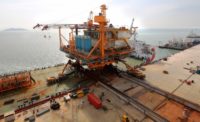Viewpoint
Infrastructure Boom and EPC Firms—Take the Gain While You Can


Pablo Hernandez Schmidt-Tophoff

Li Wynn Tan
A once-in-a-generation effort to upgrade and expand American infrastructure is well underway.
Growing power demand driven by AI development, industrial onshoring and continued electrification across the economy, coupled with more focus on ensuring domestic energy security and enhancing climate resilience, means trillions of dollars will be spent to build and upgrade U.S. infrastructure for decades to come.
EPC companies, which specialize in delivering complex projects on time and on budget, will play a critical role to execute construction of our nation’s most critical infrastructure.
The sector has faced key challenges over time—unbalanced risk-sharing with customers, a shortage of skilled labor, inflation and supply chain disruptions, to name a few. These have contributed to a turbulent period for the EPC sector—leading to cautious investor sentiment, reduced access to capital, fewer growth opportunities and retrenchment from more challenged end markets.
But the significance of the U.S. infrastructure mission has begun to improve EPC firm fortunes in a meaningful way. Ambitious capital programs for the foreseeable future have forced customers to acknowledge their reliance on trusted and qualified contractors to meet the pace and magnitude of their own capital budgets. They realize there is only a limited number of contractors with end market expertise, capacity to largely self-perform and value through end-to-end service offerings.
While a national or global footprint can be important, so can being strategically located near key customers and in high demand regions. Increasingly, EPCs are becoming symbiotic partners rather than mere commodities—forming customer relationships that include participating in key decisions to shape their future growth plans.
Such relationships also provide EPCs with the foundation for long-term improved risk-sharing and favorable contract arrangements that can lead to more consistent and profitable execution.
The EPC sector also is laser-focused on improving productivity. To meet growing demand, firms are boosting their skilled labor base, curating a high-quality subcontractor network and expanding talent promotion and retention. Rapid advancement and adoption of digital technologies and enhanced data collection through AI, geomatics, drones, virtual reality and remote monitoring also are improving overall efficiency, collaboration and communication.
EPC firms are well positioned to capitalize on strategic opportunities that, if properly executed, will allow them to reap benefits from this once-in-a-generation infrastructure mission
Strategic merger and acquisition strategies have allowed companies to scale benefits, extract synergies and better address challenges such as rising costs and an aging workforce. M&A also has enabled EPCs to have an immediate presence in new key end markets such as data centers and renewables, and capitalize on emerging long-term macro trends.
As a result, the EPC sector and related infrastructure services businesses are driving record levels of investor interest—especially for companies with strong market position and platform characteristics.
Viewed as key beneficiaries of the long-term infrastructure buildout, investors and strategic buyers both seek to capitalize on supportive tailwinds and expected growth and profitability set to result.
Industry dynamics will continue to evolve, but the sector is well positioned to capitalize on available strategic opportunities that, if properly executed, will allow companies to reap substantial benefits from this once-in-a-generation infrastructure mission.
By further investing in workforce and operational development, advocating for more balanced risk-sharing and embracing strategic transformation where needed—EPC companies not only will meet immediate demands of the current U.S. infrastructure boom but also will safeguard their long-term sustainability and indispensable role in shaping that market.
Pablo Hernandez Schmidt-Tophoff is a managing director and Li Wynn Tan is a director in the Power, Energy, and Infrastructure Group of global financial advisory firm Lazard. They can be reached at pablo.hernandez@lazard.com and li.tan@lazard.com, respectively.


